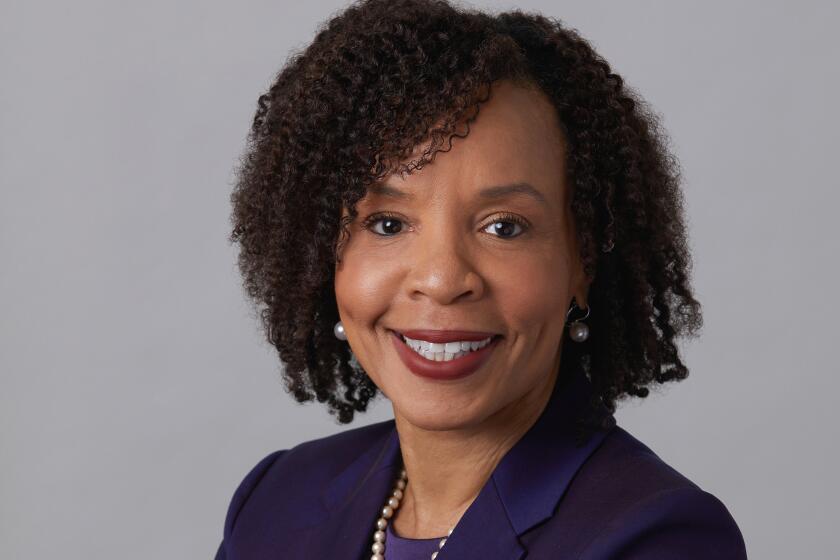Congress finds a rare accord
Now that the Iraq Study Group has issued its report, the word bandied about by both parties Wednesday on Capitol Hill was “change.”
“We are at a point where we know that what we’re doing now is not working, and we need a change of course,” said Sen. John Cornyn (R-Texas), a staunch administration ally. “There is a broad consensus of that.”
“This report that was delivered today represents another major blow at that ‘stay-the-course’ policy. It is clearly strongly supporting changing the course in a number of ways,” said Sen. Carl Levin (D-Mich.), who will chair the armed services committee when Democrats take control of the Senate next month.
After years of rhetoric that locked both parties into rigid positions on the war, the consensus on change is new on Capitol Hill -- and indeed in Washington.
The accord developed, in part, because much of the report’s substance was known in advance, through leaks to the press and the Washington rumor mill. Another reason was the avoidance of such red-flag words as “victory.”
“Basically, we’re all saying the same thing,” acknowledged a senior Republican aide who requested anonymity when discussing party policy. The report, he added, “is kind of like the Bible -- everyone interprets it as they see fit.”
In coming months, Democrats are expected to use their newly won majorities in the House and the Senate to open a far-reaching debate on the war. Iraq Study Group co-chairman Lee H. Hamilton, a former congressman, said the panel’s members already have as many as 20 requests to testify at hearings on Capitol Hill.
“We’re going to bring in every reasonable person we can find -- left, right and center, military, civilian and government -- to discuss elements of this report and discuss what alternatives there may be beyond or included within the report,” said Sen. Joseph R. Biden Jr. (D-Del.), incoming chairman of the Senate Foreign Relations Committee.
Divisions and rancor may reemerge as that debate gets underway, but for the moment, Republicans and Democrats found little to disagree about in the report -- or with each other.
A few Democrats grumbled that the report didn’t go far enough: Sen. Barbara Boxer (D-Calif.) said she was disappointed that the group failed to propose a specific timetable for troop withdrawal and dismissed the idea of dividing Iraq into semi-autonomous ethnic regions. “That’s a mistake,” she said.
A few Republicans suggested that everyone should back the president, as the government’s chief executive and the military’s commander in chief: “American policy should flow from our shores with one voice,” said Rep. Duncan Hunter (R-El Cajon), outgoing chairman of the House Armed Services Committee.
But that was as contentious as it got.
“If the Iraq Study Group can agree on three major and flexible policy shifts in Iraq and 79 specific recommendations, the hope is the Congress and the administration can do the same,” said Sen. Pat Roberts (R-Kan.), outgoing chairman of the Senate Intelligence Committee.
Another point of agreement was that it is now up to President Bush to respond to the report’s recommendations.
“In all of the last 3 1/2 years, this is the first time that I have seen the opportunity for a new path to be paved in Iraq,” said Sen. Dianne Feinstein (D-Calif.). “It is such an opportunity, and I truly hope that the president seizes this opportunity.”
Indeed, the main person not singing along with the chorus Wednesday was the president, who promised in his 2000 campaign to be a “uniter” but now finds himself outside an emerging consensus in Washington. At a White House photo session with congressional leaders Wednesday afternoon, Bush said only that the report was “interesting” and “there’s some very good ideas in there.”
“The fact of the ISG report may be more important than what it actually says,” said Sen. Lamar Alexander of Tennessee, a member of the Republican leadership. “It creates an environment in which everyone, including the president, can take a fresh look at Iraq and try to develop a consensus, come up with the right solution and go forward.”
*
More to Read
Get the L.A. Times Politics newsletter
Deeply reported insights into legislation, politics and policy from Sacramento, Washington and beyond. In your inbox three times per week.
You may occasionally receive promotional content from the Los Angeles Times.






